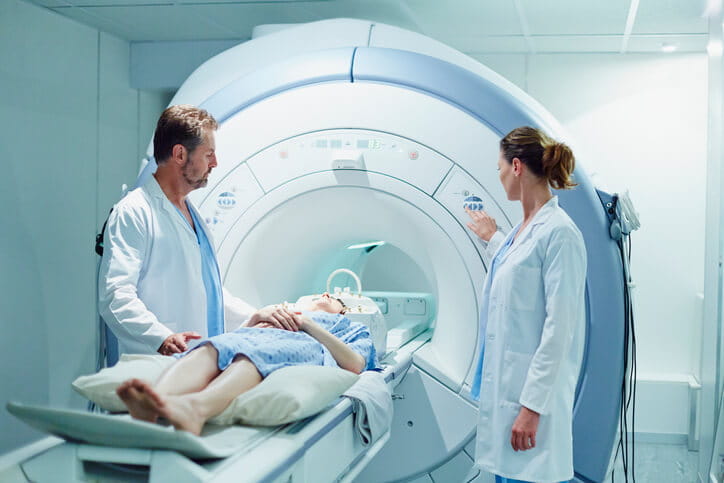Imaging and Diagnostics
That Treats You Like Family
Learn About Mammography
The magnetic resonance imaging (MRI) machine is frequently used to help diagnose a wide range of diseases and medical conditions, including cancer, heart disease, and disorders of the bones and joints. If you have a metal implant in your body, though, an MRI can be dangerous for some metals due to excessive magnetic field interactions. That said, there are certain implants that are deemed MRI-conditional, which will be outlined below.
MRI-conditional means that if manufacturer specifications are met for your implant, it’s safe for you to get an MRI. Other terms, such as “MR-safe” or “MRI-safe,” means that it’s technically MRI-conditional. If you get an MRI at Baptist Health, our physicians will make sure the conditions are met and that it’s safe for you to get an MRI.
Even though some implants can pose problems for MRIs, it’s important to note that the majority of implants are now safe for MRIs. Here’s a list of implants that can safely go through an MRI scan:
It’s safe to get an MRI with newer pacemakers or defibrillators, but there are certain precautions you should take with older ones. Many older devices aren’t FDA-approved for use in an MRI scanner and your doctor will need to evaluate your device and take any necessary precautions.
To ensure your safety, doctors at Baptist Health will make sure your device is set so it won’t malfunction during an MRI and the scanner will be set so it won’t exceed specific speeds and intensity limits. After your test, your implanted device will be checked and adjusted, if necessary.
Metal that’s well secured to your bone, such as hip and knee joint replacements, will not be affected by an MRI. The metal won’t heat up or move as a result of getting an MRI. If the metal is near an organ, such as the prostate, distortion of the image could become an issue. Doctors at Baptist Health will make sure that an MRI is an appropriate examination and, if necessary, recommend another exam that works for your situation. Here are some compatible, non-magnetic metals that can be used in an MRI:
If you have metal tooth fillings or other permanent dental implants, you should be fine getting an MRI. Detachable metal braces or retainers should be removed before getting an MRI. If you need an MRI of your head or neck, having a lot of metal in your mouth can distort the images, which makes it less useful as a diagnostic tool. If your braces aren’t detachable, your doctor may ask you to have your braces removed before coming in for your MRI.
Surgical clips and stents are safe for MRIs. One exception would be if you have a surgical clip that was used to repair an aneurysm, which can be dangerous in an MRI because it can cause bleeding in the brain. Doctors at Baptist Health will make sure the make and model of your brain aneurysm clip are safe for an MRI.
The most common type of surgical stents, coronary artery stents, are considered safe because they’re not typically made from a ferromagnetic material. If your stent is elsewhere in your body, such as an artery in the neck, Baptist doctors will investigate before doing an MRI.
If you have questions or concerns about your safety during an MRI due to implants, contact the Baptist Health Imaging and Diagnostics team to schedule an appointment.